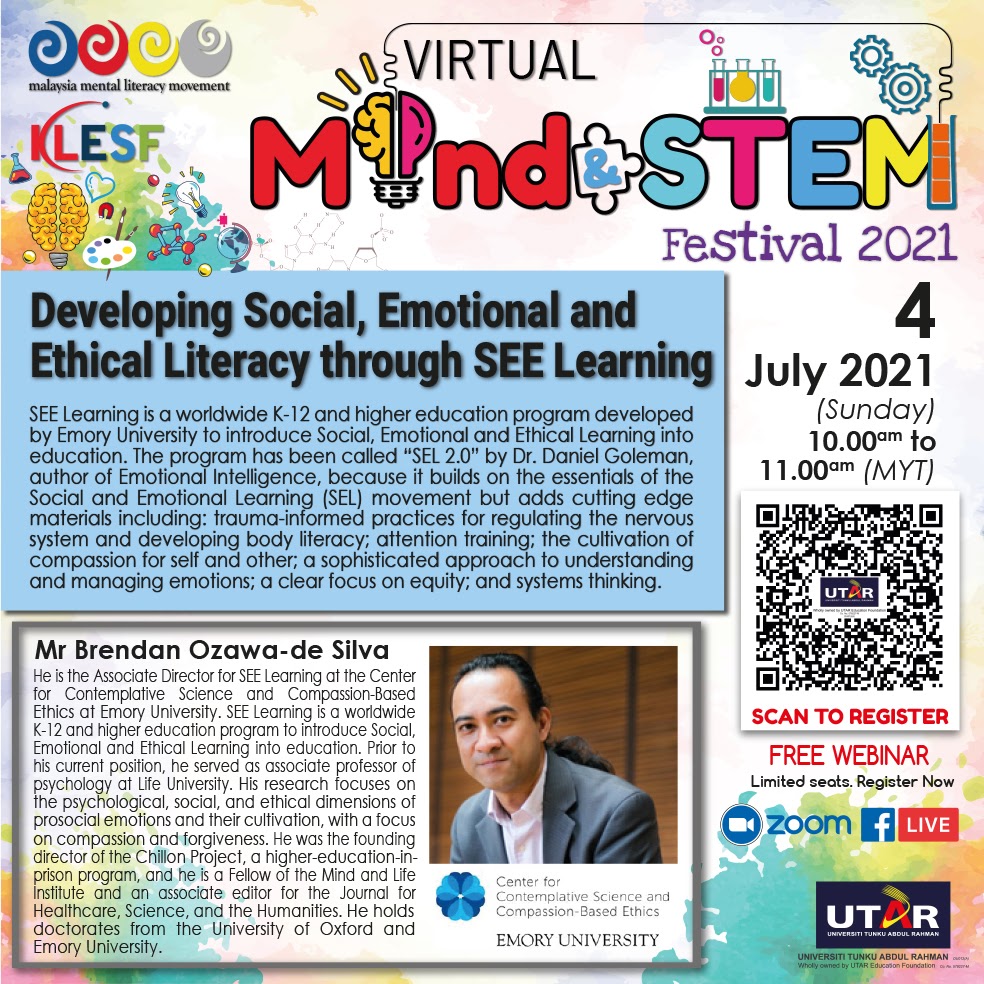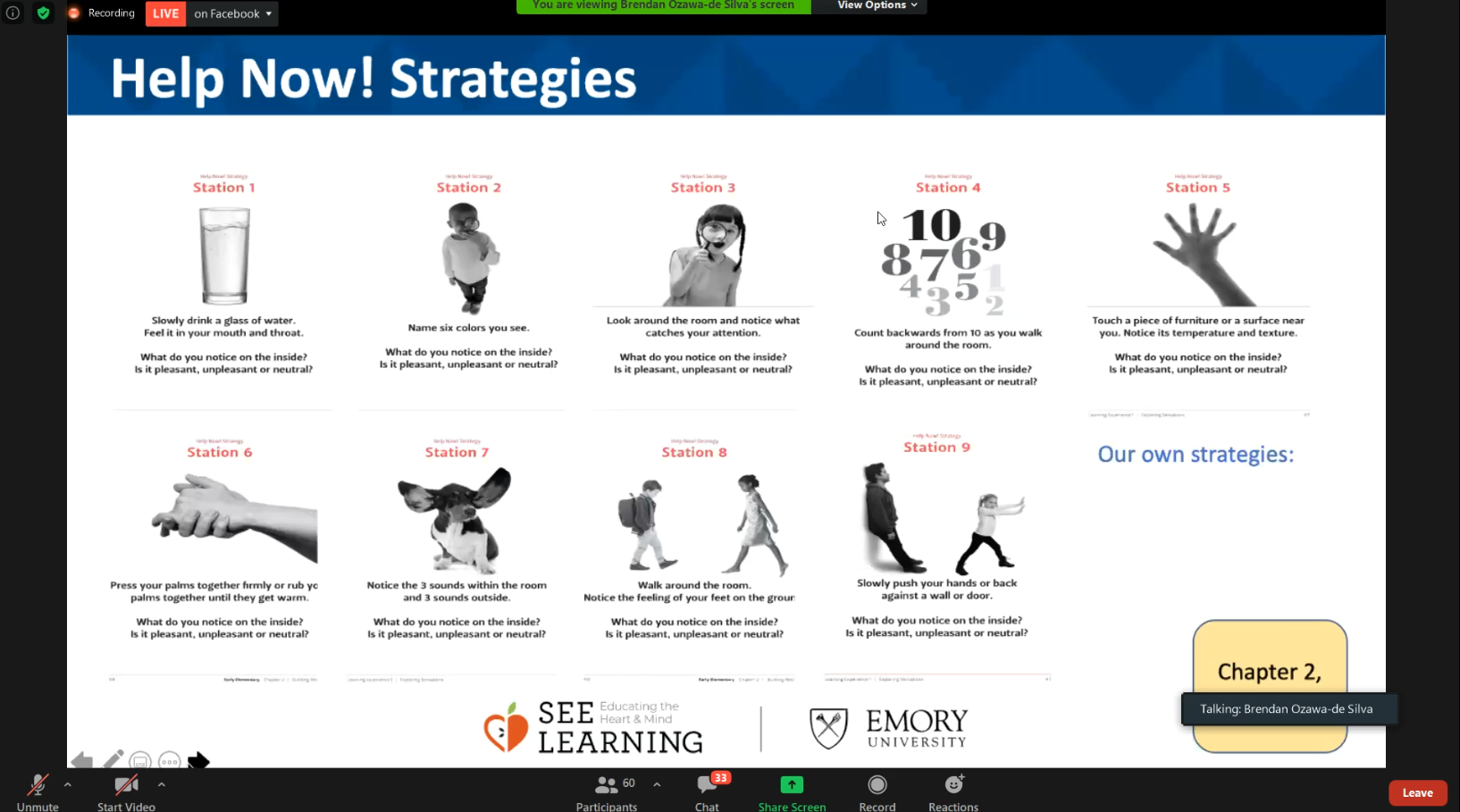

A webinar titled “Developing Social, Emotional and Ethical Literacy through
SEE Learning” was conducted on 4 July 2021 via Zoom. Held as part of the
Virtual Mind
& STEM Festival 2021 programme, the webinar aimed to introduce SEE
Learning, a worldwide K-12 and higher education programme developed by Emory
University to introduce social, emotional and ethical learning into
education.
Present to deliver the webinar was Dr Brendan Ozawa-de Silva, the associate
director of SEE Learning at the Center for Contemplative Science and
Compassion-Based Ethics, Emory University. Before this, he was a psychology
associate professor at Life University.
.png)
Dr Ozawa interacting with participants
Dr Ozawa introduced, “The SEE Learning programme has been called "SEL 2.0"
by Dr Daniel Goleman, author of Emotional Intelligence, because it builds on
the essentials of the Social and Emotional Learning (SEL) movement but adds
cutting edge materials including trauma-informed practices for regulating
the nervous system and developing body literacy; attention training; the
cultivation of compassion for self and others; a sophisticated approach to
understanding and managing emotions; a clear focus on equity and systems
thinking.”
Dr Ozawa showed participants the examples of perceptual illusion and said,
“Sometimes it’s not only our eyes that play tricks on us but our brains too
at times play tricks on us in many different ways. We not only have
perceptual illusion, but also cognitive illusion or cognitive distortion.
The perceptual illusion shows us that the way the earth appears to us is not
always the way it is; what we see is not what it truly is. The appearance
and reality can be different and it is important for us to realise that. If
we believe what we see, we will fall into a thinking trap. A thinking trap
is a cognitive distortion; it is an example of our mind playing tricks on
us.”
He shared the six thinking traps and provided strategies for participants to
avoid and deal with the thinking traps. The six thinking traps include
polarised thinking (all or nothing / black or white), overgeneralising,
catastrophising, fundamental attribution error, survivorship fallacy and
mind reading. Dr Ozawa said, “The strategies we can use to avoid and deal
with thinking traps are mindful dialogues, critical thinking, scientific
literacy and system thinking, for instance, looking from a different
perspective.”
Dr Ozawa also shared three increasing challenges for youths, namely the
rising rates of depression and anxiety, attempted suicide among adolescents,
teens and youth, increased demand among employers for employees with “soft
skills” and the increase of global challenges facing young people in the 21st
century (climate change, conflict, justice issue, etc).
Nearing the end of the webinar, he advised participants to practise the
mental model of the SEE Learning programme, namely resilience, “Resilience
is a state of well-being and regulation for the body and mind where a person
feels controlled and able to be their “best self”. Our bodies sometimes
react to danger when there is no real threat to our survival, or hold on to
a sense of danger after a threat has passed. This can lead to a
dysregulation of the nervous system, in turn damaging one’s ability to
concentrate and learn, and can even compromise their physical health.
Fortunately, we can learn to calm our body and mind and regulate our nervous
systems by practising resilience to enhance this type of self-care.”

Dr Ozawa showing a resilience-based approach - Help Now! Strategies to the
participants
The webinar then saw an active interaction between the speakers and the
participants. The talk ended with an extensive yet insightful Q&A session.
To view the full video, click
here.
![]()
Wholly owned by UTAR Education Foundation (200201010564(578227-M)) LEGAL STATEMENT TERM OF USAGE PRIVACY NOTICE